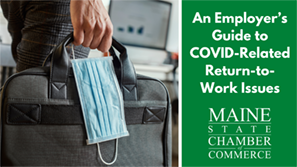|
|
|
The COVID-19
Edition for Thursday, June 25, 2020 |
To view this edition of Impact online,
click here. |
|
Welcome to
your COVID-19 Impact newsletter! |
|
|
As a valued member of
the Maine State Chamber of Commerce, we plan to stay in touch with you
several times each week through emails like this one and on Facebook and Twitter, until the pandemic passes. We
intend to provide you with the latest state and federal information, as well
as highlighting the creativity and innovation that is occuring here in Maine
during this unpredictable and rapidly changing time. To assist you in
navigating the uncertainties ahead, we have created a diverse and
comprehensive collection of web-based resources to help you take care of yourself and your family, your employees, your business, and your community. |
|
|
Do you have a question? ASK THE EXPERTS. |
We are here to
help in any way we can! |
|
DOE Begins the Work of
Creating Maine Learning Platform |
|
Created by Maine educators for
Maine educators and students, The Department of Education is proud to
announce that the work of creating the Maine Learning Platform has
begun. To provide anytime, anywhere
learning options and resources for educators, students and their families,
the Maine Department of Education, in collaboration with curriculum
coordinators, Maine educational community organizations, museums, learning
centers, and Maine educators, is creating a library of asynchronous learning
modules that are aligned to Maine's Learning Results. Developed by the over 400 Maine educators who have answered the call to create innovative lessons, these modules will be integrated to ensure that learning is synthesized across subject areas, and are project-based to encourage learning that is active and engaging. The Department is developing a custom web-based platform to house these modules. The platform will provide educators and families with a bank of resources, with which they can provide students robust learning opportunities. These modules could be utilized for enhancing lessons, remediation, enrichment, credit recovery, or for use during remote learning - whenever a student cannot access classroom instruction. Each module will be designed
around the essential question, "How do I Interact with and Impact My World?"
The format will organize modules by grade level in grades pk-5, and by grade
span for grades 6-8 and 9-12. The essential elements of each of the modules
include: * A project-based format; * Best practices in
asynchronous lesson design; * Embedded formative
assessments and opportunities for students to check for understanding; * Standards in two or more
content areas, three preferred; * Opportunities to demonstrate
growth in one or more of the Guiding Principles; * Content that is inclusive of
experiences of non-white students; * Considerations in
accommodations for special education and English Learners; and, * Embedded elements of
social/emotional/behavioral learning and trauma-informed practices. During the first planning meeting that was held on June 15, 2020, the elements, format, and timeline were reviewed with the dynamic group of teachers, and the brainstorming and collaboration began for creating modules for a quarter of a school year. The platform will be launched
at the beginning of September, and feedback on the modules will inform the
continued development process throughout the 2020-2021 school year. We are
excited by the professional collaboration and creativity that the platform
will ignite with Maine educators, and by the development of organic,
Maine-based learning resources and opportunities. |
|
With Coronavirus Impacting
Local Budgets, King Highlights Need for Critical Investments in Education for
Upcoming School Year |
|
Senators
cite parents' ability to return to work, students' stunted learning progress,
and disruptions in the future workforce |
|
Today, U.S. Senator Angus King
joined a group of 41 Senate colleagues to urge Congressional leaders to
include additional
federal funding to help students safely return to the classroom in
upcoming coronavirus relief legislation. The Senators note that without swift,
comprehensive Congressional action, it will be difficult for America's
100,000 K-12 public schools - which are already facing severe budget cuts -
to prepare to protect students, teachers, staff, families, and the community
from the spread of coronavirus in the coming academic year. The Senators also spell out the harmful
ripple effects that a lack of consideration would have on students, families
and the economy. The CARES Act provided a
much-needed $30.75 billion down payment on education funding, which is not
nearly enough to help cover the additional costs from this school year while
also ensuring that schools nationwide will be ready to safely reopen in the
fall. Under the law, $13.5 billion went to K-12 emergency relief grants,
while $13.95 billion was made available for a Higher Education Emergency
Relief Fund for colleges and universities, with the remaining $2.95 billion
directed to an Education Stabilization Fund for disbursement to governors. |
|
Determining Your Families
First Coronavirus Response Act Eligibility |
|
On Tuesday, U.S. Department of
Labor's Wage and Hour Division launched a
new online tool that guides workers through a series of questions to help
them determine if they are eligible for paid sick leave or expanded family
and medical leave under the Families First Coronavirus Response Act
(FFCRA). As America continues to
re-open, this tool stands to help employees and employers to determine who is
qualified for the FFCRA protections and benefits. We hope you will become familiar with this
new tool and share with others as you deem appropriate. |
|
Claims for Unemployment
Compensation for the Week Ending June 20 |
|
For the week
ending June 20, the Maine Department of Labor recorded about 2,900
initial claims filed for state unemployment insurance, and an additional
2,700 initial claims filed for federal Pandemic Unemployment Assistance
(PUA). These claims represent about 4,500 individuals filing an initial
claim. Between March 15 and June 20, the Maine Department of Labor has seen
roughly 162,000 initial claims for the state unemployment program and 72,400
initial claims for the PUA program. There have been about 1.4 million weekly
certifications filed, and the Department has paid out more than $882 million
in federal and state unemployment benefits. The Maine Department of Labor also
continues its careful review of all claims as it investigates unemployment
imposter fraud. "We continue to see lower
numbers of claims being filed. We believe that this trend will continue as
businesses continue to reopen and the economy improves," Commissioner
Laura Fortman said. The Department would like to remind people that in
certain circumstances people can collect partial
unemployment while working. |
|
Maine Hospitals, Doctors
Seek $120M in Pandemic Relief |
|
This afternoon, Mainebiz reported that Maine hospitals
and doctors are asking the state for a total of $120
million in relief to make up for the massive losses they've experienced
because of the COVID-19 pandemic. In a letter to Gov. Janet Mills, the Maine
Hospital Association seeks $100 million while the Maine Medical Association
wants $20 million. Like the state's tourism
industry, which is seeking $800 million in relief from money Maine receives
through the CARES Act, the health care groups are suggesting the use of
federal funds. In March, hospitals and doctors stopped providing nonemergency
care due to the coronavirus crisis. |
|
Thursday, June 25 | The
Bottom Line Podcast with U. S. Senator Susan Collins |
|
|
|
U.S.
Senator Susan Collins was this week's special guest on The Bottom Line podcast. She joined The Bottom Line co-hosts Dana Connors
of the Maine State Chamber of Commerce and John Williams of Williams
Broadcasting to discuss the Paycheck Protection Program she co-authored, as
well as other federal programs related to the COVID-19 pandemic's impact on
the economy. To listen to the archived recordings,
please visit The
Bottom Line page on the Maine State Chamber's website. In addition, The Bottom Line podcast can be heard
on iTunes, iHeart Radio, Soundcloud, Stitcher Radio, Spotify and radio.com. |
|
Letter to the Editor | Maine
State Chamber Sees Value in Quality Early Care, Education |
|
On Tuesday, June 23, the following Letter
to the Editor appeared in the Portland
Press Herald. It was submitted by Megan Diver, senior government affairs
specialist at the Maine State Chamber of Commerce, in
response to a May 30 op-ed by Tara Williams, executive director of the
Maine Association for the Education of Young Children, highlighting the value
of early childhood education in Maine and urging support for early learning
akin to that of K-12: consistent, multifaceted funding streams. We have
excerpted and abbreviated it below, but encourage you to read
it online in its entirety. |
|
From a business and economic
standpoint, early care and education programs are essential. High-quality
early programs are an investment in Maine's future workforce. They teach kids
the cognitive, social and emotional skills they need to succeed when they
start kindergarten. This helps put many kids, especially at-risk kids, on a
trajectory to succeed throughout school, graduate from high school, achieve a
post-secondary degree or credential and enjoy a rewarding career. More immediately, early
education programs and their workforce make it possible for many Maine people
to work. In some cases, whether a parent can go to work depends on their
ability to access early learning programs. That access is especially
significant today for essential workers and those returning to work as
Maine's economy reopens. These programs also provide a
safe and nurturing place for kids when parents are at work. When parents are
secure in the knowledge that their kids are well-cared for, they are better
able to focus on their jobs and perform well. Child care and early learning
are key to Maine's economic strength for many reasons. It's time these
programs are supported similarly to K-12 education. Mainers, our communities
and our economy depend on it. |
|
Opinion Editorial | Thomas
Donohue and Dana Connors: U. S. Senator Collins is the Bipartisan Leader
Maine Needs |
|
On Tuesday, June 23, the following Op-Ed appeared in the Bangor Daily News. It was submitted by
Thomas J. Donohue, CEO of the U.S. Chamber of Commerce, and Dana Connors, president
of the Maine State Chamber of Commerce. We have excerpted and abbreviated it
below, but encourage you to read
it in its entirety online. |
|
In a time when America seems
more divided than ever, and we have so many significant and overlapping
challenges, the need for leaders who are able to come together is critical.
We need bipartisanship to solve problems and leadership to drive the economic
recovery. Strong bipartisan passage of the U.S.-Mexico Canada Agreement
earlier this year and the CARES Act this spring - the largest federal relief
bill in history - reminds us that strong support on both sides of the aisle
is essential to meaningful and lasting legislative achievements. At the
forefront of such efforts is Maine's
Sen. Susan Collins, who we salute as a true champion of bipartisan leadership. This year, the U.S. Chamber
launched a new award to reward bipartisan leadership in Washington. Since the
days of Thomas Jefferson and Andrew Hamilton, America has benefitted from
leaders who found ways to work together despite their differences. The new
Jefferson-Hamilton Award for Bipartisanship recognizes those members of
Congress who have demonstrated a willingness to work across the aisle in support
of common objectives. The score is based on the number of bills - except
those formally opposed by the Chamber - a member cosponsors that is
introduced by a member of the opposite party. Collins earned the Jefferson-Hamilton Award with a 100% score. The time for bipartisan
leadership is critical for small businesses in Maine and across the country.
Nearly 8 in 10 small businesses are either fully or partially open, according
to the MetLife and U.S. Chamber Small Business Coronavirus Impact Poll.
Supporting them now to help revive our economy is more important than ever. Whether
it's COVID-19, the economic crisis, or working towards a more just society,
we need strong but thoughtful leaders willing to listen as much as lead - and
to act, not just talk. Maine is fortunate to have such a leader in Collins. |
|
Discover & Deliver:
Communities Across America are on the Frontlines to Identify Effective
Treatments and Vaccines |
|
The U.S. Chamber of Commerce's
Daily Bulletin yesterday reported
that, when it comes to medicine, the most promising treatments may be those
that already exist. That's why across the country, hospitals are conducting
clinical trials with hundreds of existing therapeutics - therapeutics used to
treat patients with other diseases - to measure their effectiveness in
combating COVID-19. For example Gilead's
promising anti-viral Remdesivir has made headlines for months, with data
showing it helps shorten hospital recovery times. Now, Gilead is testing an easier-to-use
inhaled version of the medicine. Also in the pipeline to serve
coronavirus patients: new drugs originally discovered to treat rheumatoid arthritis
and a generic steroid that has been used for decades to treat patients
suffering from everything from allergic reactions to spine and brain tumors. These
trials are happening everywhere - in 224 congressional districts and counting;
in communities large and small; in hard-hit hot spots like New York City and
in less affected regions like Dakota
Dunes, South Dakota. In other words, the forefront
of medical innovation might be right in your backyard. Soon, the U.S. Chamber
will release a new, interactive map to show in real time where COVID-19
clinical trials are taking place throughout the United States. "We hope
people will use the map to identify how they can support - and even
participate in - important clinical trials. said Jonathan Weinberger,
executive vice president, GIPC, at the U.S. Chamber of Commerce. "That
support and participation could make all the difference in the fight against
COVID-19." |
|
Strada and the Center For Consumer
Insights Issues Results and Findings to Its COVID-19 Work And Education
Survey |
|
On Wed., June 24, Strada Consumer Insights has issued
results and findings to its Public
Viewpoint: COVID-19 Work and Education Survey. Learn more about our
research and the value of the education consumer perspective here. As Americans consider how
COVID-19 has disrupted their work, education, and daily lives, many are
looking ahead to how education and training might shape their futures. One in
three American workers say they would change careers if they lost their jobs,
meaning many, would need to reskill.
But who is most interested in changing fields? What fields will they look to
move into? And what do they want their education or training to look like? This
week's data also shows what is motivating the workers looking to change
fields - and for about half, the decision isn't about finances or career
advancement. This nationally representative survey, based on more than 11,000
responses collected between March 25 and June 11, is intended to provide
insights to the education and training providers, policymakers, employers,
and individual Americans who are navigating the COVID-19 crisis. |
|
Human Resource Updates for Maine's Pandemic Times |
|
Our partners
at hrsimple are offering Coronavirus updates, as
well as events and webinars,
specifically for Maine businesses. The company also produces the Maine State
Chamber's "Maine Human Resources Library,"
authored by Maine State Chamber members, Bernstein Shur and Littler.
These in-depth HR guides include Maine and federal employment law in one
soft-cover book and online with form and policy templates so your business
has a single resource for what to do and how to do it for everything from
pre-hire through post-termination. For more than 30 years, hrsimple has
translated the legalese of labor and employment laws and regulations into
plain English. It has worked with every State Chambers of Commerce / Business
and Industry Association in the country, providing businesses large and small
with the information they need to understand how to comply with what to do,
how to do it, and a little bit of the why. |
|
National Association of
Manufacturers Rolls Out "Wear a Face Covering" Ad Campaign |
|
The National Association of
Manufacturers (NAM) has developed a one-minute
ad campaign intended to help the country's economic resurgence while protecting
families across the country. The ad will run in manufacturing-intensive
states and shows many of America's highest capacity and most iconic stadiums,
including Michigan Stadium, Beaver Stadium, Ohio Stadium, Kyle Field, and the
Rose Bowl. The number of U.S. COVID-19 deaths exceeds the capacity of any one
of those stadiums. NAM is also encouraging people to share
the ad on personal, company and organization social media channels. "Through shared
responsibility, we can get this pandemic under control and save small
businesses and jobs," said NAM President and CEO Jay Timmons. "That's why the
NAM is taking this message across the country. Our economy depends on it,
jobs depend on it and - most importantly - lives depend on it." |
|
Use the Maine State Chamber's Blog and Daily
Impact to Tell Your Story! |
|
Numerous Maine companies are stepping up or
pivoting nimbly, as Maine people resourcefully address the challenges of this
pandemic. Share your perspective and experience with us and with the rest of
the business community. How are you facing and overcoming the challenges
posed by this pandemic? What are you and your employees doing in this
dramatically different economy? Tell us about the innovations your company or
employees are making or ways you have adapted your company to meet your
customers' needs. Each
blog entry should be 300 to 500 words. Join
us in creating a written history of the business community's resilience and innovation
during this extraordinary time. Please
submit your entries to [email protected]. For
more information or questions, please contact Mark Ellis by emailing [email protected] or
by calling (207) 623-4568, ext. 109. |
|
|
Webinar's Election
Update |
|
On Thursday, June 18, the Maine State Chamber of Commerce
hosted an election update with Secretary of State Matt Dunlap. The virtual event
was free and one of many webinars the Maine State Chamber has hosted since
March. Secretary Dunlap spent time discussing how the COVID-19 pandemic will
affect voting, polling places, absentee ballots, and more ahead of Maine's
July 14 statewide primary election. Secretary Dunlap has provided the following new
resources for voters, hoping that these materials will increase voters'
confidence and understanding of their voting options during this pandemic. *
An animated video explaining the
absentee voting process in Maine; *
A video message featuring
Secretary Dunlap discussing the upcoming election; and *
Easy-to-see
graphic links on the homepage of the
Department of the Secretary of State website, quickly
connecting voters with the online Absentee Ballot Request service and the
printable voter registration card. Secretary Dunlap is encouraging absentee voting
for this election, as it will help reduce the possibility of virus exposure
for voters and election workers. It is a method the Bureau of Corporations
Elections and Commissions has used for many years, so they know it is a
secure and safe way to cast your ballot. In-person voting
and Election Day voter registration will also continue to be available, to
ensure that every eligible voter can participate, and virus prevention
measures will be in place at polling sites. Secretary Dunlap discussed Gov. Mills'
executive orders making changes affecting voting (EO #39 and EO #56). Those changes include: *
An expansion of
the deadline to submit voter registration applications by mail or
third person: Voters have until close of business on July 7. (In-person registration
is still available through Election Day.) *
An expansion of
the deadline to request an absentee ballot: Clerks will accept requests in
person (or by written, signed request submitted in person by a third
party) up to and including Election Day. To ensure timely receipt of the
ballots, requests made by other means, such as the online form, must be made
far enough in advance to allow time for mailing. *
The option for
municipal clerks to provide secure drop boxes for absentee ballots. *
Allowing consolidation
of polling places up to 15 days prior to Election Day. *
Allowing changes
to the location of polling places up to 10 days prior to Election Day. To request an absentee ballot and/or register
to vote, please click here.
To view last Thursday's recording of the election update with Secretary
Dunlap, please click here. |
|
|
THANK YOU TO OUR WEBINAR SERIES SPONSORS: Bangor Savings Bank,
Central Maine Power Company, and |
|
|
|
Tuesday's
Webinar Provided |
|
The Maine
State Chamber hosted an informative webinar Tuesday offering legal guidance for
employers as many employees return to work during the COVID-19 pandemic.
Presenter Anne-Marie L. Storey, Esq., partner at
the Bangor law firm Rudman Winchell,
shared important information, recommendations and guidance for preparing
workplaces, determining how employee recalls will work, ongoing unemployment,
special accommodations for employees, including employees with concerns
regarding COVID-19, and more. Storey emphasized the need for employers to have a plan ahead of
returning employees to work, the importance of communicating with employees
as they return, making sure safe practices and precautions are well-established
with visible reminders, and tips on social distancing, sanitizing workplaces,
and permissible actions employers can take in light of HIPAA and the unique
circumstances COVID-19 presents. Storey also shared legal guidance surrounding liability and
lawsuits in the COVID-19 era, and the importance of flexibility to
accommodate employees who may have medical, family
or childcare concerns about returning to the workplace. Employers are encouraged to watch the
recorded webinar if they missed it. It provided a wealth of information
intended to protect employees and employers, as well as recommendations on
accommodating employees and tips on being flexible as employers navigate the
return of their workforce. The webinar can be viewed in its entirety
here. Additionally,
recommended resources for preparing workplaces include OSHA, CDC, the Maine
Department of Labor, and the U.S.
Department of Labor. |
|
|
Hey, If You Can Work From Anywhere,
Why Not Maine? |
|
Live + Work in
Maine is promoting a survey to capture data and anecdotes about remote working in
Maine. This effort is targeted at a broad range of people: those who are
working at home due to COVID or those who have been a remote worker for
years. As part of that effort, the organization will be developing some
marketing ideas and launching a campaign aimed at promoting Maine as an ideal
place to work remotely. Secondly, they
have created a landing page on the Live + Work's website that will act as a starting
place for remote working resources in Maine. The organization wants to
highlight Maine employers who are embracing remote work - this could mean
allowing employees to work from where they choose, being open to new hires
working remotely, adapting a new work-from-home policy, etc. There is more to
come as the survey data is compiled and the survey findings are shared. Please
feel free to share this information with employees, in your newsletters, and on
social media, etc. |
|
One week ago, we sent out a notification to our Board of
Directors about an initiative, called "Work with Maine," that recently went
live and is being spearheaded by Chamber Board member, Peter Connell. As you
are well aware, tourism is the backbone of Maine's
economy. In 2018, Maine's hospitality sector had a statewide economic
contribution, including multiplier effects, of an estimated $6.9 billion in
output, 79,000 full- and part-time jobs, and $2.2 billion in labor income,
according to a study released last fall. This is all at risk if we don't act now. With Governor Mills' 14-day quarantine, and then her
administration's replacement plan, which forces out-of-state travelers to
either quarantine or obtain and prove that they have received a
negative COVID-19 test within a 72 hour window prior to traveling to Maine, our
tourism industry is being crippled. We need your help! We receive numerous calls on a daily
basis from business members, and out-of-state tourists alike, telling
us how unworkable this plan is. As a gentleman from Massachusetts said yesterday,
"We have been looking forward to traveling to Maine all year. With these
restrictions in place, I don't see any possible way that we can make it to
Maine." He went on to explain that testing is limited where he is located.
He planned to travel to Maine during the July 4th weekend and questioned
whether testing would even be available prior to a holiday. This gentleman
ended our conversation yesterday by thanking us for our help in providing
information and stating that perhaps this year they would need to visit
Vermont or someplace that allows easier travel. This has been the common
theme over past weeks and months. Unfortunately, this plan does not work for
Maine and it does not work for our out of state tourists. Please, we urge you to join us in telling the
Governor and her Administration that this plan does not work for Maine.
Together, our voices will be louder. |
|
TAKE ACTION! "Work with ME" is looking
for the support of Maine's people. Please visit www.WorkWithMaine.com today to review their plan and add your voice to this
coalition, and like/follow their Facebook page for
updates. |
|
To advertise in the COVID-19 Impact, please contact Melody Rousseau |
||
|
Thank you for doing your part! |
||
|
|
|
|
|
TO
UNSUBSCRIBE, CLICK HERE. |
NOTICE: In an ongoing effort to thwart
the activities of online hackers, the Maine State Chamber |









